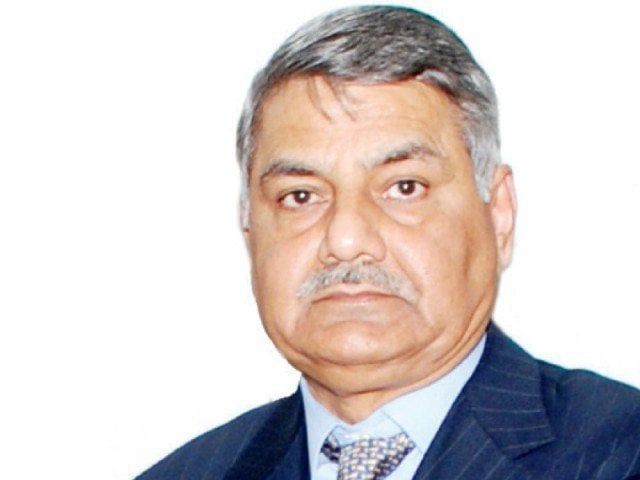Rumour mill in high gear as NAB chief bows out after brief stint
PM ‘reluctantly’ accepted resignation of Sultan

Aftab Sultan resigned as chairman of the National Accountability Bureau (NAB) on Tuesday citing 'personal reasons', after holding the office for only seven months.
Sultan was appointed to the post of the head of the anti-corruption watchdog by the incumbent government last year in July to succeed Justice (retd) Javed Iqbal
Sources told The Express Tribune that the head of the anti-graft body walked out with “grievances and reservations”.
The Prime Minister's Office (PMO) confirmed Sultan's resignation in a short statement. "The Chairman, National Accountability Bureau, Mr Aftab Sultan, presented his resignation to Prime Minister Muhammad Shehbaz Sharif citing personal reasons."
The statement added that Prime Minister Shehbaz Sharif "appreciated the services" of Sultan and "lauded his honesty and uprightness".
"Upon his insistence, the Prime Minister reluctantly accepted the resignation of Mr Sultan."
Sultan, a retired Police Service of Pakistan officer who has a reputation for being honest, earlier served as IGP Punjab and the commandant of the National Police Academy.
PML-N supremo and former premier Nawaz Sharif appointed Sultan as head of the Intelligence Bureau in 2013 because of being an upright official. He retired as the IB chief on April 3, 2018, after serving since June 7, 2013.
Sultan was the one who, being a senior police officer deployed in Sargodha during the Musharraf regime, had refused to help him in the 2002 referendum. In return, Sultan was demoted to the rank of an officer on special duty.
In addition, Sultan was also chosen by former premier Yousuf Raza Gilani of the PPP, making him the only officer who served with two different governments. Apart from Sharif and Gilani, Sultan has also served under former premiers Raja Pervez Ashraf and Shahid Khaqan Abbasi.
Sultan is a law graduate from Punjab University, who later did LLM from the University of Cambridge and also MSc in jurisprudence/legal studies from the University of Edinburgh.
‘Across-the-board accountability’
As the NAB officials settled into an auditorium at the bureau’s head office on Tuesday morning, the air was heavy with unspoken knowledge. It was unusual for the NAB officials to see an outgoing boss expressing concerns about the state of affairs of the anti-graft body and the country in a passionate but composed manner.
In his roughly five-minute speech, Sultan touched on the subjects ranging from meaningful accountability to upholding the Constitution and rule of law and from standing firm on one’s principles to the importance of working within constitutional limits without being considered less patriotic.
The outgoing NAB chairman delivered the speech before Prime Minister Shehbaz Sharif “reluctantly” accepted his resignation on Tuesday morning.
Though he cited personal reasons, people in the ruling coalition and those present at the auditorium found it a bit more than just personal reasons. In his speech, those present at the auditorium said, Sultan stressed the need to go for “across the board accountability” – a slogan long echoed in Pakistan but hasn’t yet been implemented.
Elaborating on his point, Sultan told the NAB officials that a person strives for years to gather money for a plot but then someone suddenly deprives him/her of the money by committing fraud. “It is imperative to hold the fraudster accountable,” he said. “It takes a life’s possession to get a plot but a minute to lose all.”
“Constitution and rule of law must prevail,” Sultan said while addressing the gathering, saying the constitution was there and it was important to follow it.
During his speech, the sources revealed, Sultan said that political stability could come to the country after ‘two-three elections’, adding only people had the real power in the democratic process and system.
“No one is more patriotic than the other,” he was quoted as saying, implying that all institutions should keep working within their defined boundaries. Though, the sources emphasised, he didn’t use the word ‘interference’ but implied that this was what he meant to say when he reiterated that no one could claim to be more patriotic than others.
In the end, Sultan motivated the young officers, saying they have the potential to take NAB to new heights.
As opposed to leaving NAB for personal reasons, a media outlet quoted Sultan saying he resigned from the office a few days ago as he was “asked to do certain things which were not acceptable”, adding “I told them that I cannot continue with the conditions.”
The resignation due to apparent differences over the government’s accountability policy was evident as one key cabinet minister was of the view that if one can’t file a corruption reference despite having solid proof then it was better for him to leave.
‘Collapse of fascist system’
Reacting to the development, Pakistan Tehreek-e-Insaf (PTI) Senior Vice Chairman Fawad Chaudhry said that Sultan’s resignation is a big step towards the collapse of a fascist system, saying he resigned over the ‘interference’ in his work,”.
He asked the recently-appointed 22 officers in Punjab to follow Sultan’s footsteps and step aside, saying “it is in the interest of both the country and the bureaucracy.”
The former judge of the Islamabad High Court, Shaukat Aziz Siddiqui, however, felt that Sultan should have kept working instead of surrendering to the corrupt system and political pressure, especially, when he had become acquainted with NAB’s system.
The outspoken judge tweeted that it was least expected from Sultan to leave this way.
Surprising as it may seem, political commentators said that despite the existence of the graft-buster –created in 1999 –corruption has only increased in the country in the past two decades.
The lack of accountability and absence of meaningful accountability is a reason why democracy is still weak in Pakistan, they pointed out and added it was time to go for an across-the-board accountability process.



















COMMENTS
Comments are moderated and generally will be posted if they are on-topic and not abusive.
For more information, please see our Comments FAQ